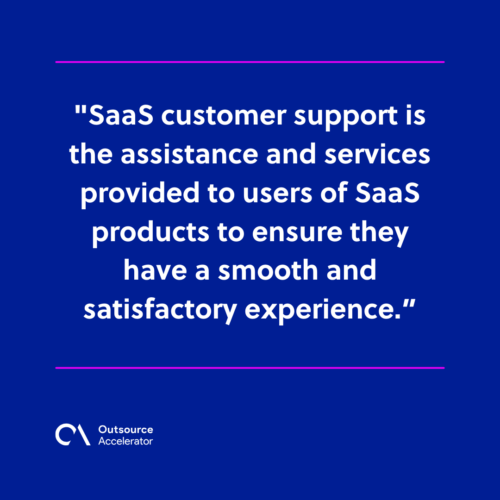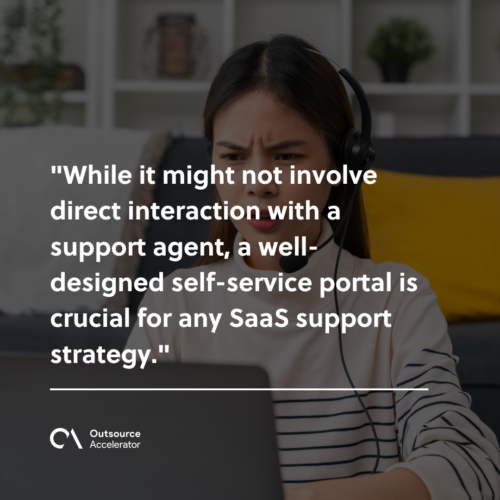Your essential guide to SaaS customer support

Software as a Service (SaaS) companies have shaken up the way businesses and individuals access software. From productivity tools to project management platforms, SaaS solutions have become an integral part of our daily lives.
But what makes SaaS companies stand out from the crowd? The answer lies in their customer support.
SaaS customer support is not just about solving technical issues — it’s about creating an exceptional user experience that drives customer satisfaction and loyalty.
Effective customer service can make or break a SaaS company, as unhappy customers are more likely to switch to competitors. In fact, a Salesforce study found that 80% of customers would stop using a product or service after three negative experiences.
But fear not! Our essential guide will arm you with all the knowledge and strategies you need to deliver top-notch assistance that keeps your users happy and your business thriving.
What is SaaS customer support?
SaaS customer support is the assistance and services provided to users of SaaS products to ensure they have a smooth and satisfactory experience.
It covers various activities to maximize the value users derive from the software, such as:
- Resolving technical issues
- Answering queries
- Providing guidance
- Offering training

Importance of SaaS customer support
Customer support is crucial for any SaaS company as it directly impacts customer satisfaction and retention.
In a competitive market, satisfied customers become loyal users, leading to increased revenue and positive word-of-mouth. Bain & Company’s data revealed that firms with a customer service mindset drive revenue 4% to 8% higher.
Let’s paint a clearer picture of why effective SaaS customer support benefits a business:
- Customer retention. When users receive prompt and efficient support, they are less likely to switch to competitors.
- Upselling opportunities. By building a strong relationship with customers, SaaS firms can identify upselling opportunities and increase revenue.
- Reduced churn. SaaS providers can reduce churn rates and retain a larger customer base by addressing user concerns promptly.
- Better product development. Customer feedback obtained through support interactions can provide valuable insights for product improvement.
Essential elements of an effective SaaS customer support strategy
To build an effective SaaS customer support strategy, consider incorporating the following elements:
24/7 availability
In today’s world, where we’re all easily connected, customers expect support to be available round-the-clock. Consider implementing a live chat feature or a ticketing system that ensures timely responses.
Self-service resources
Provide users with a knowledge base, FAQs, and video tutorials. These resources let users find solutions to common issues independently, reducing the need to contact support.
Multichannel support
Meet customers where they are comfortable. Offer support options through multiple channels, such as phone, email, chat, and social media.
Personalized support
Personalize interactions with each customer by using their name and addressing their individual needs. Personalization enhances the overall customer experience.
According to McKinsey, 71% of consumers expect businesses to give personalized interactions. If tailor-made support wasn’t given, 76% claim to feel frustrated.

Streamlined onboarding
Simplify the onboarding process by providing step-by-step guidance to new users. This reduces the chances of them encountering difficulties early on.
Efficient ticket management
Implement a ticket management system to ensure that user inquiries are organized and assigned to the appropriate team members. This helps in prioritizing urgent issues and tracking progress.
10 best practices for SaaS customer support
Here are some best practices to adopt to ensure top-notch SaaS customer support:
1. Active listening
Train your support agents to listen to users’ concerns and questions actively. This means giving them your full attention, asking clarifying questions, and showing genuine empathy.
Active listening builds rapport and ensures that the support provided is targeted and effective.
2. Empathy
Show empathy towards customers by acknowledging their frustrations and validating their experiences. Put yourself in their shoes and understand that even a small issue can have a big impact on their productivity.
By showing empathy, you create a positive user experience, even in challenging situations.
3. Quick response time
Aim to respond promptly to customer inquiries. Harvard Business Review shared that businesses that reach out to potential customers within an hour of receiving inquiries are about seven times more likely to have meaningful conversations.
Set clear response time goals for your support team and equip them with the tools and resources they need to respond quickly and efficiently.
4. Continuous training
Regularly train your support agents on new features, product updates, and the best ways to address issues.
Ongoing training ensures that your team is equipped with the knowledge and skills needed to provide accurate and up-to-date information. It also helps them stay confident and capable in their roles.
5. Proactive communication
Be proactive in your communication with customers. Reach out to them before they even notice a problem. For example, inform them in advance about scheduled maintenance, system upgrades, or known issues.
Proactive communication helps manage user expectations and reduces the chances of them feeling frustrated or caught off guard.
6. Metric tracking
Keep track of important support metrics such as response time, resolution time, and customer satisfaction scores. Monitoring these metrics can identify areas for improvement and measure the effectiveness of your support efforts.
Use these insights to make data-driven decisions and continuously enhance your customer support strategy.
7. Foster a strong connection between support and product
Foster collaboration and communication between your support and product teams. By doing so, support agents can provide valuable feedback and insights to the product team.
This collaboration helps identify recurring issues, prioritize feature enhancements, and ensure the product meets customer needs.
It also facilitates a seamless support experience as agents deeply understand the product and can provide accurate assistance.
8. Automate routine tasks
Consider automating routine tasks or behaviors to free up your support agents’ time for more complex issues.
This could involve setting up templates for responses to FAQs or using AI-powered chatbots to handle simple inquiries. Automating routine work can also help reduce agent burnout and improve response times.
9. Build a support community
Create a support community where customers can connect with each other to ask questions, share insights, and provide peer-to-peer support. This can be in the form of a dedicated forum, online community platform, or customer support portal.
A support community not only allows customers to get help from other experienced users but also reduces the load on your support team.
Encourage active participation and provide moderation to ensure a positive and helpful environment.
10. Cultivate a customer-centric culture
Prioritize the satisfaction of your users across the organization. This means encouraging all employees, not just support agents, to always put the customer first.
Train your employees on the importance of providing excellent customer service, and reward staff who go above and beyond to delight customers.
By cultivating a customer-centric culture, you create a positive brand image and ensure that your users remain loyal for the long haul.
Examples of SaaS companies with excellent customer support
When it comes to SaaS customer support, some companies have set the bar high. Here are a few examples:
Headspace
Headspace excels in welcoming and retaining new customers. This is largely thanks to its strategic onboarding email approach rather than solely relying on product appeal.
Its initial email is packed with helpful tips on getting started and the benefits of its product. Subsequent emails are then tailored to typical user behaviors, like addressing drops in usage with personalized guidance.
So, what sets Headspace apart is that it invests in understanding its customers and crafting engaging and informative content to assist them on their journey.
Slack
While it might not involve direct interaction with a support agent, a well-designed self-service portal is crucial for any SaaS support strategy.
It’s more than just a list of FAQs — it should be an intuitive resource that acts as a virtual support agent.
Take Slack, for example. Its self-service portal includes an auto-suggest feature in the search bar. Even if users aren’t sure how to phrase their questions, this feature guides them to the most relevant article.

Evernote
Don’t fall into the trap of thinking that once you’ve created a knowledge base or self-service resources, your job is done. Just like your product, support resources should always evolve and improve to better serve your users.
Even if your product is complex, like Evernote, you can still take a proactive approach. This note-taking and task-management app asks users for feedback on the helpfulness of articles and encourages them to report any issues.
Plus, if users can’t find the answers they need, they have a direct link to the support team for further assistance.
Shopify
Shopify has taken advantage of the fact that solving an issue through social media is much cheaper compared to resolving it through call center services.
This is backed up by data from Social Media Today, which showed that handling a customer issue on social media costs just around 1/6 of what a call center interaction costs.
Shopify also utilizes its X (Twitter) handle for user support, where it responds to complaints and provides proactive updates and notifications.
Elevate your SaaS customer support experience
SaaS customer support plays a crucial role in driving user satisfaction, retention, and product success.
However, delivering exceptional user support in the SaaS industry goes beyond just addressing inquiries — it’s about creating meaningful interactions and prioritizing the customer’s needs.
By implementing effective strategies and learning from industry examples, you can elevate your SaaS customer support experience and set your product apart!







 Independent
Independent




